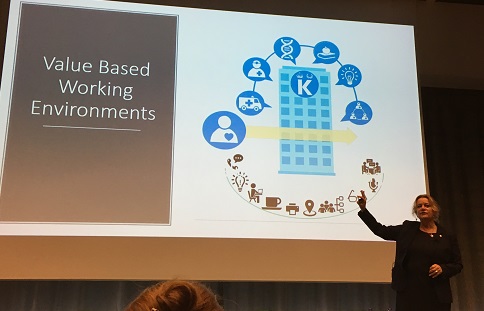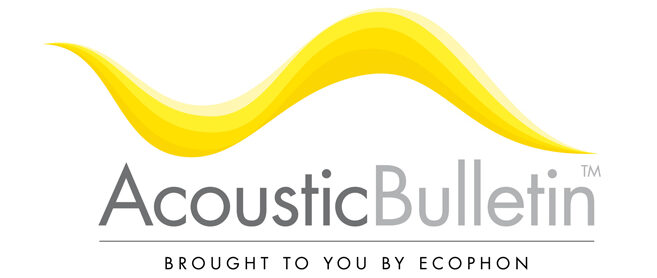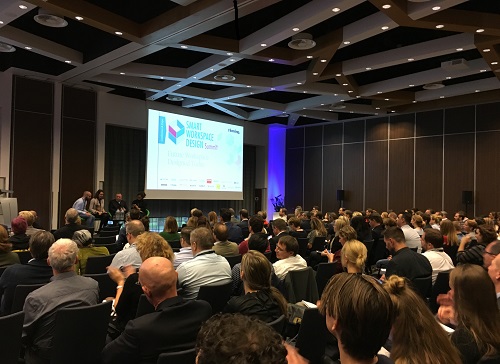
Smart Workspace Design Summit took place in Amsterdam October 4-5 (2018) and participants from all walks of the workplace trade joined in as to share and acquire related knowledge. You may call this event an international knowledge hub for workplace design. Two days of content, five expert panel discussions and two workshops. The broad approach to subjects attracts people from design, architecture, HR, facility management, workplace fields, indoor environmental quality, change management, real estate etc. This makes it also really interesting to interact with the people in the pauses and between talks. Watch a short event film here.

Of course acoustics was also partly on the agenda, via Ecophon specialists. Yvette Tietema (Concept Developer, Ecophon Netherlands) delivered a speech named “Organisational cognitive neuroscience and attention”. She presented a study on neuroscientific findings related to attention, brain workers and acoustics / sound / noise. The other Ecophon contribution came from Paige Hodsman (Concept Developer, Ecophon UK) and Tania Barney (Consultancy and Training, UK), titled “Designing for differences: Neurophysiological factors and office acoustics, an exploration of the literature”. This presentation covered the individual differences in sensitivity to our senses, including the auditory one. Implications of office design, organisation and workplace was covered. If you want to know more about this, read these blog posts too. Paige / Tania + Yvette
It is of course not possible to cover everything from such a large event, so below I touch upon the speeches I attended and found was valuable for me and the readers of this blog. The bullet points are aspects covered and sometimes my own notes.
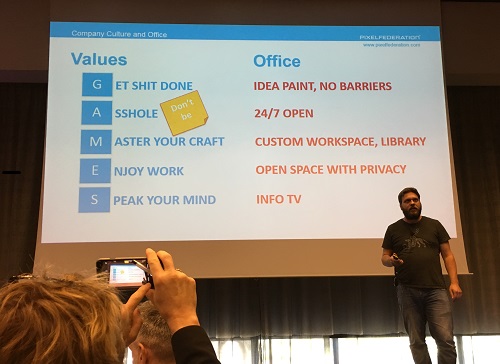
What we should have done: Lessons learned from our office transformation by Alexander Paveleka (from game developer Pixel Federation in Bratislava, Slovakia).
- The culture and history of their company
- The office as a part of the company culture
- The values of their company = GAMES (see photo above). You can also use their office for private purposes outside office hours (24/7), such as private parties. It is a matter of trust and responsibility
- They had some challenges in the open-plan office, especially visual privacy, but have adjusted positions of desks and behaviour
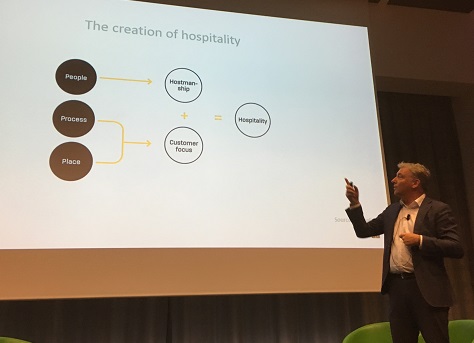
The importance of a Hospitality strategy in Workplace Design by Robert Guijt (DZAP architects and project managers in Netherlands.)
- If you want your customers to love your company, your employees have to love it first
- Key words in relation to the host and guest: curiosity, openness, humility, patience, respect, presence and trust
- More companies should think about the power of the hospitality approach
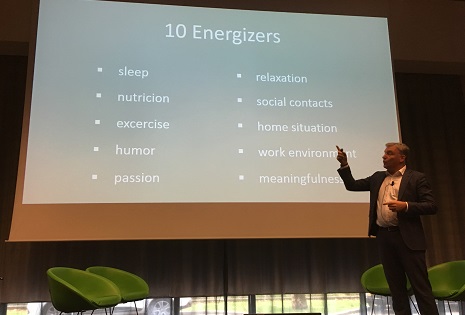
Dive into employee productivity and engagement by Henk Smeenk (KLM Royal Dutch Airlines, Netherlands.)
- Teamwork vs an individual approach
- Increasing staff engagement and results
- KLM created an internal design guide – especially since they have a large amount of buildings
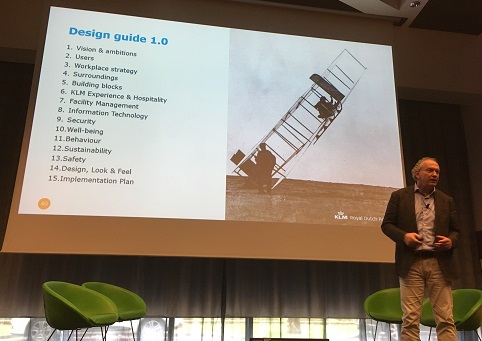
Pride and productivity by Anicee Bauer (Design Studio D/DOCK) and Ronald van Es (Macaw), Netherlands
- Macaw (IT firm) has been acknowledged “Certified Great Place to Work” and been awarded the best employer in Netherlands four times
- They presented how Macaw engaged Design Studio D/DOCK as to use their Healing Offices design concept
- They touched upon how to measure the effect of environmental quality
- What defines productivity and the value of a company?
- Collaboration between Human Resource and Facility Management important
- Anicee described D/DOCK:s “concept” – Healing offices. Sources of and coping with noise is part of the indoor climate part
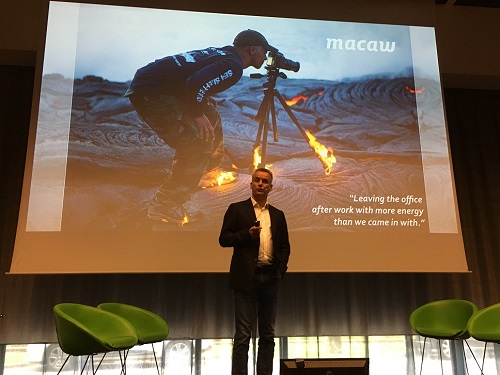
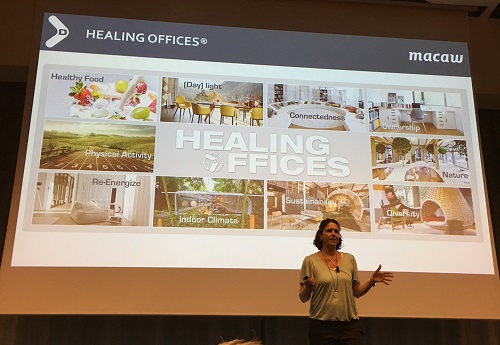
Sony’s smart office journey by Johan Grundström Eriksson (Sony, Sweden)
- The smart office is already a reality
- Sony in Lund, Sweden, adapted Activity Based Working already ten years ago
- Flexible workstyles support innovation and collaboration
- Utilization of space in new ways as to match capabilities of our technology
- Sony also informed about their smart office solution nimway (your personal assistant, locate rooms, find colleagues, office utilisation etc.)
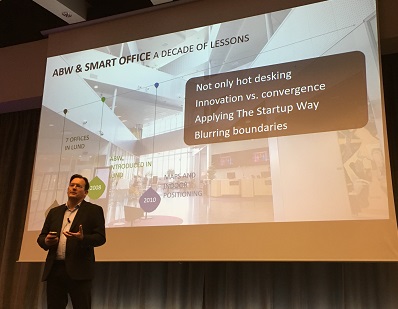
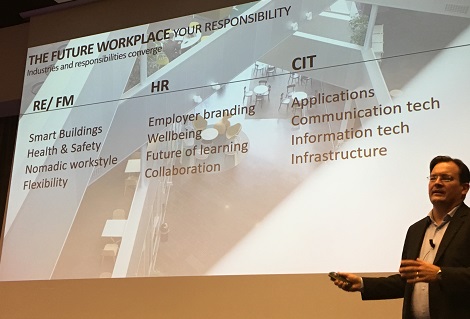
New working and learning spaces – design principles for creativity and wellbeing, by Christine Kohlert (RBSGroup, Germany)
- Do we still need offices in the future?
- Importance of belonging
- Thinking and working together
- Six dimensions and wellbeing
- Biophilic design
- Personal communication and innovative ideas are linked
- Christine wrote a book: “Space for creative thinking”
- Good acoustics is part of the physical comfort
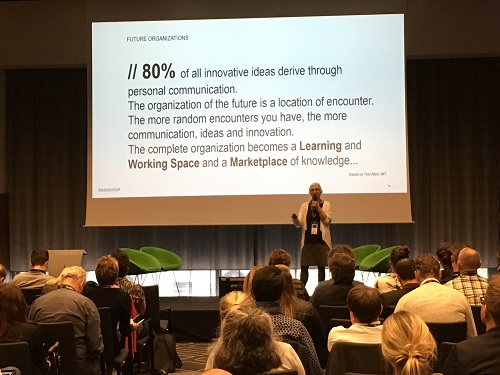
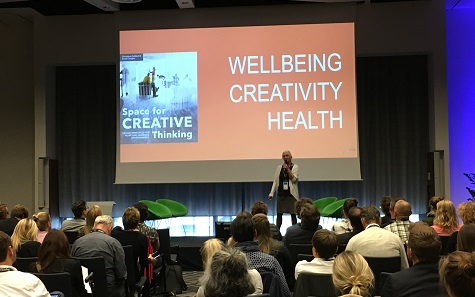
Transformation of numerous buildings into SMART and complex entity by Ron van der Weerd (Henze university, Groningen, Netherlands)
- Ron used to be the dean of the school of FM, but now he had to act from “the other side” as programme manager for this transformation
- One campus but different buildings
- Work space is more than a workplace
- Different working cultures in one company
- Different working cultures require different workspaces
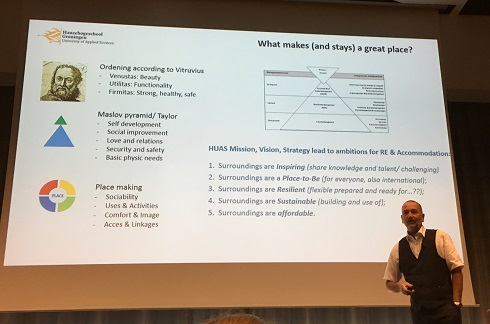
Workplace innovation for business innovation by Mireya Juarez (HP, EMEA Workplace Experience Strategy and Planning, Spain)
- What are the real needs of the business?
- Moving from a workplace provider to a true strategic partner
- Moving from “spending” to “investment”
- Data, people, technology, square metres, experience….
- Regarding Milleniums, it is not about how old they are but a state of mind
- They staged workshops using Lego as to involve / engage workers and staff
- Never ask what they need!
- Design is a process of communication and interaction
- Designers, architects, workplace strategists are the ones who need to change
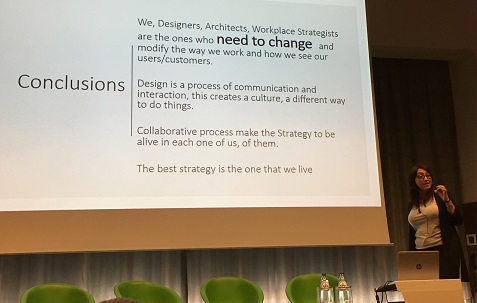
Multi-building transformation into one connected environment, by Lizette Engelen (Karolinska University Hospital, Sweden)
- The journey of Karolinska hospital to develop Value Based Working Environments
- Workplace strategy based on Bricks, Bytes, Behaviour and Branding
- Using service design, empathy and data as design tools
- It is about creating value for everyone
- Now (and in the future) everything can be monitored. Collecting and monitoring human data: an ambulance might come and pick you up, because “in 20 minutes you will have a heart attack”!
- It is and was difficult to get out of the question “I want my own room” (Breaking down walls)
